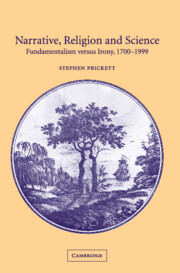Book contents
- Frontmatter
- Contents
- Acknowledgements
- Introduction: Arthur Dent, Screwtape and the mysteries of story-telling
- 1 Postmodernism, grand narratives and just-so stories
- 2 Newton and Kissinger: Science as irony?
- 3 Learning to say ‘I’: Literature and subjectivity
- 4 Reconstructing religion: Fragmentation, typology and symbolism
- 5 The ache in the missing limb: Language, truth and presence
- 6 Twentieth-century fundamentalisms: Theology, truth and irony
- 7 Science and religion: Language, metaphor and consilience
- Concluding conversational postscript: The tomb of Napoleon
- Bibliography
- Index
5 - The ache in the missing limb: Language, truth and presence
Published online by Cambridge University Press: 12 November 2009
- Frontmatter
- Contents
- Acknowledgements
- Introduction: Arthur Dent, Screwtape and the mysteries of story-telling
- 1 Postmodernism, grand narratives and just-so stories
- 2 Newton and Kissinger: Science as irony?
- 3 Learning to say ‘I’: Literature and subjectivity
- 4 Reconstructing religion: Fragmentation, typology and symbolism
- 5 The ache in the missing limb: Language, truth and presence
- 6 Twentieth-century fundamentalisms: Theology, truth and irony
- 7 Science and religion: Language, metaphor and consilience
- Concluding conversational postscript: The tomb of Napoleon
- Bibliography
- Index
Summary
COLERIDGE: THE LANGUAGE OF THE BIBLE
If, as previous chapters may suggest, it is possible to use the Kuhnian notion of paradigms as operating not merely in scientific discourse, but in areas like religion as well, we may suspect that such paradigms are also closely associated with theories of language. Richard Rorty has ingeniously suggested that the history of philosophy may best be understood as a series of ‘turns’ in which ‘a new set of problems emerges and the old ones begin to fade away’. The latest of these, he argues, is the ‘linguistic turn’:
The picture of ancient and mediaeval philosophy as concerned with things, the philosophy of the seventeenth through the nineteenth century as concerned with ideas, and the enlightened contemporary philosophical scene with words has considerable plausibility.
In view of what we have seen in previous chapters, the idea that we live in a period where we tend to see both things and ideas primarily in terms of words is obviously persuasive – though, as we shall see in the next chapter, not necessarily persuasive in the way that Rorty believes it to be. Indeed, it is difficult to see how any theory of narrative structure can stand independently from how we think language arose and how it functions in our present understanding of the world.
The prime example of this can be seen if we try asking the question why this interest in words only really arises in the eighteenth century.
- Type
- Chapter
- Information
- Narrative, Religion and ScienceFundamentalism versus Irony, 1700–1999, pp. 157 - 194Publisher: Cambridge University PressPrint publication year: 2002



